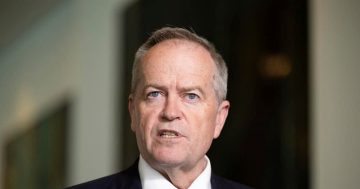
NDIS Minister Bill Shorten needs to step in to resolve the scheme’s pricing mess or watch services fold. Photo: File.
Utterly broken. Flawed. Heartbreaking.
That’s what ACT disability services providers are saying about the National Disability Insurance Scheme, or more precisely its pricing structure.
It’s not the reaction the NDIS was supposed to elicit but for not-for-profit providers such as Hartley Lifecare and CatholicCare, it’s more in despair than anger that things have reached this stage.
They are having to make unpalatable decisions to keep their services running, including cutting hours, staff and their wages.
The problem is that NDIS funding for services just doesn’t reflect the reality of delivering them.
The result is that vulnerable people, the ones the NDIS was supposed to support, could be put at risk and the sector could see a flight of staff to better-paid and more secure employment, exacerbating an already desperate situation.
Hartley provides supported accommodation, including independent living, respite care, community supports and hydrotherapy. It supports more than 100 people with disabilities in more than 35 homes and facilities across the ACT.
We’re not talking about people who may be considered marginally disabled or who some contest shouldn’t be covered by the NDIS. The services being provided are not dubious therapies or overpriced, nor do they come into the fraud and mismanagement category.
Like many charities and not-for-profits, fundraising is down as interest rates and the cost of living zip tightly people’s purses but Hartley and its kind are bleeding money because of simple arithmetic.
What is coming in from the NDIS doesn’t match what’s going out.
It is ironic that NDIS Minister Bill Shorten, a former union boss, is presiding over a system that is forcing organisations to cut workers’ pay, in effect undermining the award system to keep their clients supported.
Unions are alarmed and rushing to protect their members’ entitlements but at the price of their jobs and the sector’s sustainability.
The providers want the unions to work with them, and they should, as well as add their weight to lobbying the government about a more realistic pricing structure.
Mr Shorten has a diabolical problem with the NDIS, which is eating up more of the budget every year, with its growth ballooning under the previous government. And, yes, costs have to be reined in, rorts rooted out and fraud eliminated.
The breadth of the NDIS coverage has grown to unexpected lengths, so there is scope for scaling back to its core purpose.
The services that Hartley and CatholicCare and others like them provide are central to that core purpose. They should not be the target of NDIS razor gangs.
If they cannot deliver what they do without hollowing out their organisations, then something is wrong and the NDIS will be a failure.
Mr Shorten and the bureaucrats need to sit down and talk with the providers and adjust the NDIS pricing so they maintain their staff and pay them what they are worth to continue their vital services.
The alternative is a collapse of the system, which is in nobody’s interest.



















